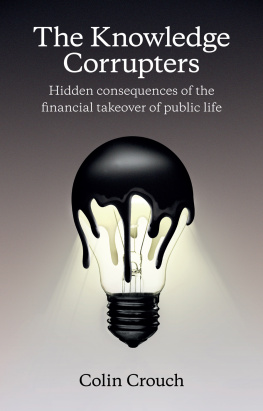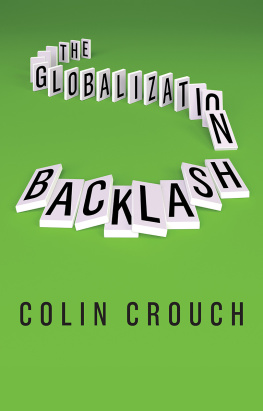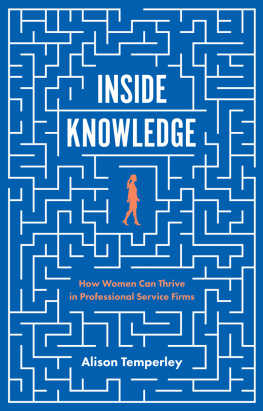
Dedication
For Joan
Copyright page
Copyright Colin Crouch 2016
The right of Colin Crouch to be identified as Author of this Work has been asserted in accordance with the UK Copyright, Designs and Patents Act 1988.
First published in 2016 by Polity Press
Polity Press
65 Bridge Street
Cambridge CB2 1UR, UK
Polity Press
350 Main Street
Malden, MA 02148, USA
All rights reserved. Except for the quotation of short passages for the purpose of criticism and review, no part of this publication may be reproduced, stored in a retrieval system, or transmitted, in any form or by any means, electronic, mechanical, photocopying, recording or otherwise, without the prior permission of the publisher.
ISBN-13: 978-0-7456-6985-4
ISBN-13: 978-0-7456-6986-1 (pb)
A catalogue record for this book is available from the British Library.
Library of Congress Cataloging-in-Publication Data
Crouch, Colin, 1944
The knowledge corrupters : hidden consequences of the financial takeover of public life / Colin Crouch.
pages cm
Includes bibliographical references and index.
ISBN 978-0-7456-6985-4 (hardback) ISBN 978-0-7456-6986-1 (pbk.) 1. Public-private sector cooperation. 2. Public administration. 3. Human services. 4. Neoliberalism. I. Title.
HD3871.C78 2015
306.3dc23
2015011654
Typeset in 11 on 13 pt Sabon
by Toppan Best-set Premedia Limited
Printed and bound in the United Kingdom by CPI Group (UK) Ltd, Croydon
The publisher has used its best endeavours to ensure that the URLs for external websites referred to in this book are correct and active at the time of going to press. However, the publisher has no responsibility for the websites and can make no guarantee that a site will remain live or that the content is or will remain appropriate.
Every effort has been made to trace all copyright holders, but if any have been inadvertently overlooked the publisher will be pleased to include any necessary credits in any subsequent reprint or edition.
For further information on Polity, visit our website:
politybooks.com
Abbreviations
| BBC | British Broadcasting Corporation |
| BMJ | British Medical Journal |
| BP | British Petroleum |
| CBI | Confederation of British Industry |
| CEO | chief executive officer |
| CQC | Care Quality Commission |
| ECB | European Central Bank |
| EU | European Union |
| FDA | Food and Drug Administration (US) |
| FSA | Financial Services Authority |
| GCSE | General Certificate of Secondary Education |
| GDA | guideline daily amount |
| GMO | genetically modified organism |
| HMI | Her Majesty's Inspectors (of Schools) |
| HMIC | Her Majesty's Inspectorate of Constabulary |
| HMRC | Her Majesty's Revenue and Customs |
| IMF | International Monetary Fund |
| IPPC | Independent Police Complaints Commission |
| LCP | Liverpool Care Pathway |
| MP | Member of Parliament |
| NHS | National Health Service |
| NPM | new public management |
| OECD | Organisation for Economic Co-operation and Development |
| Ofsted | Office for Standards in Education, Children's Services and Skills |
| PPI | payment protection insurance |
| RBS | Royal Bank of Scotland |
| TEPCO | Tokyo Electric Power Company |
| TUC | Trades Union Congress |
| UK | United Kingdom |
| US | United States |
| USCSHIB | United States Chemical Safety and Hazard Investigation Board |
Acknowledgements
I could not have written this book without the collaboration of my wife, Joan. She gathered much of the material for it; enabled me to take advantage of her years of experience in administration of the English schools system for an understanding of the working of public service professionalism, inspection and similar issues; and helped me try to make my English more accessible to general readers.
I am also grateful for ideas and encouragement from my publishers, John Thompson of Polity Press and Heinrich Geiselberger of Suhrkamp Verlag (who pointed out to me the links between what I am trying to do and the US crime series The Wire).
As always, all remaining errors and infelicities are my own responsibility.
Neoliberalism and the Problem of Knowledge
In October 2014 it was revealed that the UK National Health Service (NHS) was offering medical practitioners 55 for every patient they diagnosed as suffering from dementia. Inadequate diagnosis of dementia had become a recognized problem in the country, and the idea was that doctors might be better motivated to identify cases if they had some money incentive to do so. There was a hostile reaction from many practitioners and patients groups. Over fifty practitioners wrote an open letter, published in the British Medical Journal (BMJ 2014), to the NHS leadership protesting that payments of that kind undermined the relationship of trust between doctor and patient, which was based on professional integrity rather than payment. Some patients groups were worried that doctors were being given an incentive to make exaggerated diagnoses of dementia. Many members of the wider public were puzzled to find the NHS using money payments in this way. They should not have been surprised. The idea that money is always the best motivator of human action, superior to reliance on professional competence, has been deeply embedded in the minds of decision-makers and managers in many walks of life for years now. Many of its implications have been far more damaging than a small financial incentive to make a dementia diagnosis. The purpose of this book is to explore some of these.
That as much of life as possible should be reduced to market exchanges, and therefore to money values, is one of the main messages of the most influential political and economic ideology of today's world, neoliberalism. It is in particular deeply embedded in the most dynamic and powerful sector of the world economy, financial services, where all values are expressed in terms of the prices that can be achieved by selling assets on to others who value them for the prices that can be achieved by selling them further on, in an infinite regress of prices based on nothing other than further prices. While this brings certain important advantages, such as clear criteria of comparison of one value against another, the idea that money is the best guide to value does considerable damage if unchecked. This problem is widely recognized, and much political debate today concerns certain major examples of it. For example, unrestrained economic activity harms the natural environment, but market forces themselves can do nothing about this. Values such as love and happiness cannot be expressed as market transactions without distorting their meaning. There is a wide consensus that inadequate access to money should not prevent people from enjoying basic rights to health, education, nourishment and housing. More strikingly, the use of the financial sector's approach in its own field brought the world to a major crisis in 20078. But a far less frequently noticed victim of the dominance of money as a guide to action is knowledge. It may seem surprising, as neoliberalism is itself a highly intellectual doctrine, rooted in theoretical knowledge. Also, many market economies are associated with strong scientific performance, which depends crucially on a knowledge base. My central claim that neoliberalism is an enemy of knowledge therefore requires considerable support though the fact that distortions of knowledge clearly lay at the heart of the financial crisis makes my task of persuasion that much easier. In the pages that follow I shall provide support for my contention, and show the wider damage to human life, and in particular our attempts to ground it in ethical principles, that results from the knowledge-corrupting tendencies of neoliberalism, and why and how we must fight it.
Next page









